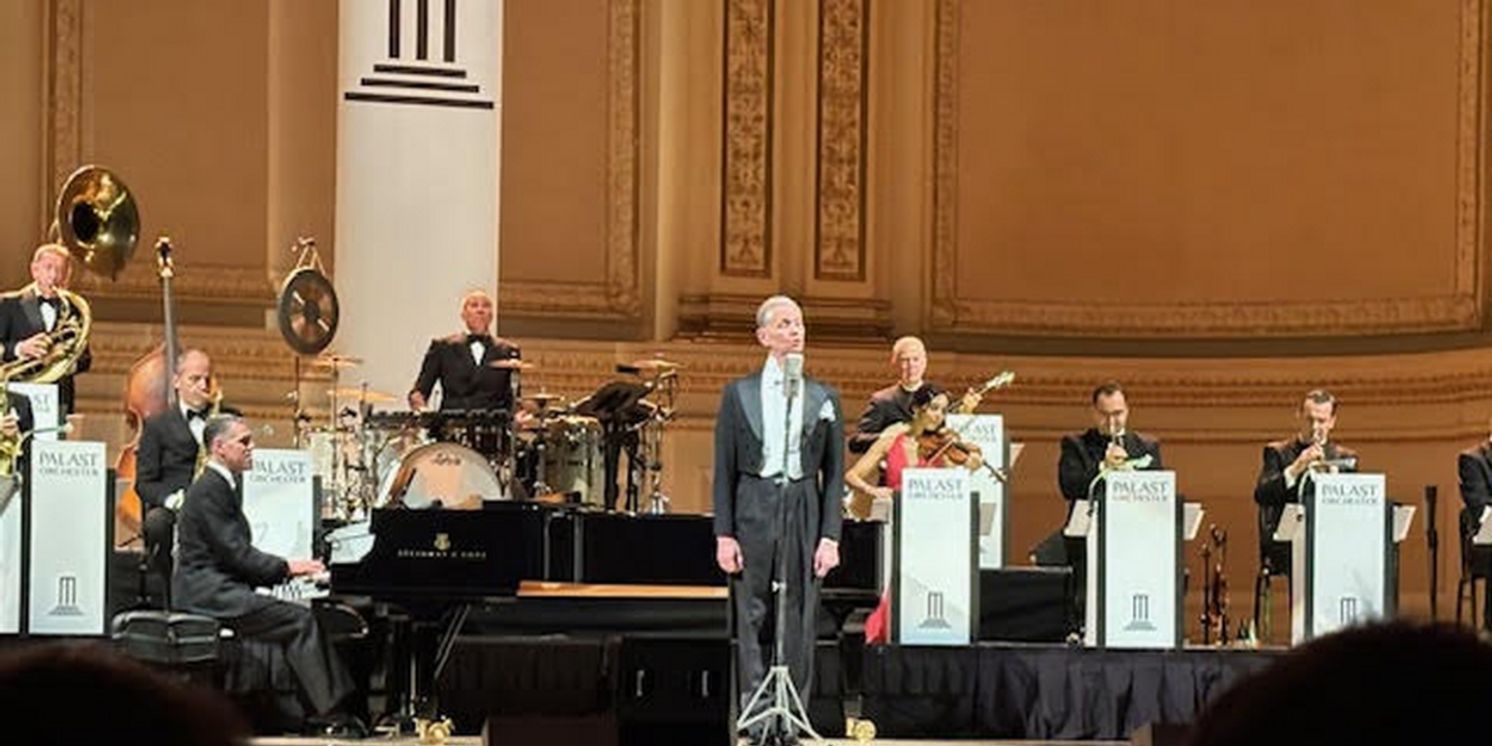Review: MAX RAABE & PALAST ORCHESTER Brings Glamour to Carnegie Hall
Max Raabe brought all on a journey through song and nostalgia.

Time travel may not be possible in reality, but it certainly felt like stepping into the late 1920’s and early 1930’s this evening at the performance of Max Raabe & Palast Orchester at Carnegie Hall on March 21, 2024. The show, part of a festival of the Fall of The Weimar Republic: Dancing on the Precipice, delves into the arts and culture of this short yet important period in the world of innovative art and culture. As our Master of Ceremonies for the evening, Max Raabe brought the filled audience of the iconic venue on a journey through song and nostalgia.
Created in the late 1980’s by German musician Max Raabe and some of his fellow musical students who wanted to perform music of the period, Max Raabe & the Palast Orchester was born. To this day you can see how much each member of the “orchester” enjoys the music in the joviality of their interactions during the show. Attired in white tie and tails and looking quite like Fred Astaire, the suave Raabe fronted the similarly elegant nearly all male “orchester” (one lone female appeared playing the violin) on a retro 1930’s microphone. It was truly as if theatergoers had fallen into a time warp and come out in Weimar Berlin, such was the overall feeling of the evening. Some theatergoers even dressed to impress in time-appropriate clothing.
As soon as he began to sing, Max Raabe had the patrons in the palm of his hand. This reviewer was overwhelmed by the happiness, and joy of the music. As if wrapped in a favorite warm blanket, the short, whimsical musical selections of the period spoke of love, honor, and the banality of human life. Unlike the present, people in the past used entertainment to forget their troubles, not to obsess on them. With his deadpan humor, Max Raabe proceeded into each musical performance with amusing anecdotes related to the culture at the time.
Crooning in both English and German, Raabe’s rendition of classical tunes had the audience singing along with hits like “Just One of Those Things” by Cole Porter and Irving Berlin’s iconic “Cheek to Cheek” and “Top Hat, White Tie and Tails”, as well as the Depression Era signature song “Happy Days Are Here Again.” In addition, many previously under the radar songs by lesser known composers were heard such as “Love Thy Neighbor”, “Over My Shoulder”, “Rosa, reizende Rosa” and “Wann wirst Du mir gehoren” among many others.
This reviewer was completely enchanted by the sheer joy of the musical performance. One just sat back and enjoyed the evening as if watching a black and white Fred Astaire and Ginger Rogers film from the 1930’s, but without the dancing. Pure and simple - it was fabulous and entertaining!
When at last the night was done, a standing ovation and intense cheering greeted Max Raabe & The Palast Orchester. For a brief time, we, the audience, had escaped our present day troubles and disappeared into another world, a world of fun and frolic. A moment in time when a glamorously dressed orchestra serenaded gleeful fans. Unfortunately, like a wonderful show that must come to its sad end, the fragile world of Weimar Germany was not able to exist for very long.
Max Raabe & Palast Orchester at Carnegie Hall featured the witty and pithy Max Raabe and his Palast Orchester, consisting of Cecilia Crisafulli (violin), Alex Freund (trumpet), Martin Sander (trumpet and vocals), Jorn Ranke (trombone and viola), Bernd Frank (tenor saxophone and clarinet), Johannes Ernst (alto saxophone and clarinet), Sven Bahrens (alto saxophone and clarinet), Rainer Fox (baritone saxophone, clarinet and vocals), Fabio Duwentester (drums and percussion), Bernd Hugo Dieterich (bass and sousaphone), Ulrich Hoffmeier (guitar, banjo and violin) and Ian Wekwerth (piano).
Find more great shows to see on the Carnegie Hall website here.
Reader Reviews
Videos

